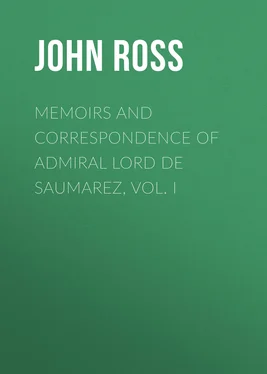John Ross - Memoirs and Correspondence of Admiral Lord de Saumarez, Vol. I
Здесь есть возможность читать онлайн «John Ross - Memoirs and Correspondence of Admiral Lord de Saumarez, Vol. I» — ознакомительный отрывок электронной книги совершенно бесплатно, а после прочтения отрывка купить полную версию. В некоторых случаях можно слушать аудио, скачать через торрент в формате fb2 и присутствует краткое содержание. Жанр: foreign_prose, foreign_antique, на английском языке. Описание произведения, (предисловие) а так же отзывы посетителей доступны на портале библиотеки ЛибКат.
- Название:Memoirs and Correspondence of Admiral Lord de Saumarez, Vol. I
- Автор:
- Жанр:
- Год:неизвестен
- ISBN:нет данных
- Рейтинг книги:3 / 5. Голосов: 1
-
Избранное:Добавить в избранное
- Отзывы:
-
Ваша оценка:
- 60
- 1
- 2
- 3
- 4
- 5
Memoirs and Correspondence of Admiral Lord de Saumarez, Vol. I: краткое содержание, описание и аннотация
Предлагаем к чтению аннотацию, описание, краткое содержание или предисловие (зависит от того, что написал сам автор книги «Memoirs and Correspondence of Admiral Lord de Saumarez, Vol. I»). Если вы не нашли необходимую информацию о книге — напишите в комментариях, мы постараемся отыскать её.
Memoirs and Correspondence of Admiral Lord de Saumarez, Vol. I — читать онлайн ознакомительный отрывок
Ниже представлен текст книги, разбитый по страницам. Система сохранения места последней прочитанной страницы, позволяет с удобством читать онлайн бесплатно книгу «Memoirs and Correspondence of Admiral Lord de Saumarez, Vol. I», без необходимости каждый раз заново искать на чём Вы остановились. Поставьте закладку, и сможете в любой момент перейти на страницу, на которой закончили чтение.
Интервал:
Закладка:
In pursuance of these orders Captain Saumarez sailed from the Nore, and, arriving at Torbay on the 17th, found that Admiral Darby had sailed in the Britannia on the 15th, after having left orders for the Tisiphone to cruise a week off the Lizard. Here he was directed to proceed for Plymouth, where he arrived on the 1st of October; and having received further orders to repair to Spithead without loss of time, he arrived there on the 13th October, to fit for Channel service. He now joined the fleet under Lord Howe, and, after a cruise off Brest, returned to Portsmouth on the 21st of November: his ship was found to sail extremely well.
Captain Saumarez was now ordered to place himself under the command of Admiral Kempenfelt, who, with a detachment of twelve sail of the line, was destined to intercept Count de Guichen, who had put to sea from Brest, after having returned from his last severe campaign. The count had been ordered to use every exertion to refit and prepare the French fleet for sea, notwithstanding the lateness of the season. The objects in view could be accomplished only by extreme diligence and the most profound secrecy, as it was absolutely necessary to reinforce Count de Grasse, with both ships and troops in the West Indies, as also M. Des Ornes and Admiral Suffrein in the East. It was evident that De Grasse, after his hard service on the coast of North America during the preceding campaign, must stand in need of a vast supply of naval and military stores; and the service he was about to undertake in the West Indies would increase the want of provisions, and almost every necessary of life and of warfare: neither was the demand for naval and military stores in the East Indies less urgent. Accordingly, a numerous convoy of transports, store-ships, and victuallers were prepared and equipped at the same time as the fleet, which was now extended to such a number of men-of-war as was considered sufficient for the protection of the convoys until fairly out of reach. This part of the service, as well as the charge of the whole expedition, was, as we have stated, confided to Count Guichen; and the command of the squadron and fleet destined to the West Indies, to M. de Vaudreuil. The Tisiphone was the look-out ship of the squadron, which sailed from Spithead at the end of November.
At day-break on the 12th December, Captain Saumarez, being the first to discover the enemy, made known his situation to the admiral; which was, that the men-of-war were too far ahead and too much to leeward of the convoy to afford any protection to it. The admiral, with that decision and professional skill by which he was so eminently distinguished, determined to profit by their situation, and boldly pushed between the convoy and the greater part of the enemy's line-of-battle ships, and succeeded in capturing twenty sail. In this affair Captain Saumarez had a noble opportunity of distinguishing himself, by attacking the ship of war, of thirty-six guns, which was bringing up the rear of the convoy, and capturing her after an action of twenty minutes.
Besides those captured, many others had struck; but, the weather at this time becoming thick and squally, the admiral discontinued the chase of those which had been cut off, and which made sail in every direction, that he might collect his squadron before dark, many of his ships being at a great distance astern with the prizes. At daylight next morning, the enemy's ships of war, twenty-one sail of the line, were seen formed to leeward; but their force was so much superior, that the admiral did not think it advisable to risk an action. The captured ships consisted of twenty-one sail of transports, having on board eleven thousand troops, besides their crews of seven thousand seamen; the greatest part of which were taken by this squadron, and the Agamemnon, which picked up five or six more.
It was now evident that the force under Count Guichen, destined to assist Count de Grasse in the capture of the valuable island of Jamaica; was much greater than had been supposed by the English government; and, consequently, it became of the utmost importance to give the earliest information of the approach of such a formidable enemy to Sir Samuel Hood. Accordingly, Captain Saumarez, whose gallant conduct and zeal had been so manifest, was selected for this service. His men were returned to the Tisiphone from the captured ships; and he was detached with orders to push past the French fleet, and make the best of his way to Barbadoes, (see Appendix) where he arrived on the 28th of January; and finding the Pegasus, Captain John Stanhope, he delivered his despatches, and received the following orders from that officer:
You are hereby required and directed to proceed (without a moment's loss of time) to the island of Antigua, where, on your arrival off English Harbour, you are to send a boat in for intelligence respecting Sir Samuel Hood and the fleet under his command; which having received from the senior officer in that port, you will proceed in search of the commander-in-chief, and deliver him the despatches you are charged with from Rear-admiral Kempenfelt, as also those you will receive herewith.
Given on board his Majesty's ship Pegasus,
Carlisle Bay, this 28th Jan. 1782.
(Mem.) I recommend that particular attention may be paid to keep well to windward of the French islands.
Signed John Stanhope.To Captain Saumarez, H.M. fire-ship
Tisiphone.
In pursuance of these orders, Captain Saumarez sailed from Barbadoes on the 28th of January. In the mean time, the Comte de Grasse, who had been beating to windward for some days with the intention of attacking Barbadoes, but without gaining ground, had abandoned his plan, and bore away for St. Kitts. On his arrival there, he landed eight thousand men, and took possession of greater part of the island: General Frazer, with a small party of six hundred men, was obliged to retire to Brimstone Hill Fort.
Sir Samuel Hood, notwithstanding the superiority of the enemy, (twenty-nine sail of the line,) resolved on a sudden and unusually bold manœuvre, namely, to sail and attack the enemy's fleet at anchor. It was for this purpose that he had put to sea with twenty-two sail of the line, and proceeded to Antigua, where he took in provisions, and embarked the twenty-eighth and two companies of the thirteenth regiment, under command of General Prescott.
Captain Saumarez, according to the orders he had received, proceeded for Antigua, and keeping "well to windward," as he had been directed to do, fell in with the Triumphante and Terrible, two French line-of-battle ships, of the squadron which had been attacked by Admiral Kempenfelt on the 12th December, and which had been detached by Comte de Guichen to Martinique. These ships immediately gave chase; but, night coming on, Captain Saumarez had recourse to stratagem in order to effect his escape, which would otherwise have been impossible in consequence of the Tisiphone having carried away her fore-top-mast in a squall, an accident which was fortunately not observed by his pursuers: he now made night-signals by hoisting lights and burning false fires; which having led the enemy to suppose he was communicating with an English squadron, they abandoned the pursuit after a chase of half-an-hour.
At the moment the fore-top-mast was carried away, Mr. Robb, one of the midshipmen, who was looking out at the fore-top-gallant-mast-head, fell on the forecastle without receiving any injury. This young gentleman was an elève of Captain Saumarez, continued with him to the end of that war, and embarked with him on board the Crescent in 1793. After the capture of La Réunion , he was promoted to the rank of lieutenant.
The fore-top-mast of the Tisiphone was soon replaced; and next day, on reaching English Harbour, he learned that Sir Samuel Hood, with his squadron was at anchor in Basseterre Roads, St. Kitts, where he had three times repulsed the enemy of a much superior force, but which had now taken up such a position as rendered it impossible for him to communicate with the admiral; for, unless he would venture to push through the intricate channel between Nevis and St. Kitts, he would run the greatest risk of being captured. Undismayed, however, at the danger of navigating an unknown passage, he fearlessly proceeded where no ship had ever before ventured; and by sounding as he advanced, and by the dexterous management of his ship, he succeeded in carrying the Tisiphone to the anchorage at St. Kitts in safety; and delivered his despatches to Sir Samuel Hood, who informed him that the intelligence was of such importance, that it was necessary it should be immediately sent on to Sir Peter Parker at Jamaica. But when the admiral proposed to send the Tisiphone on with it, Captain Saumarez, desirous of remaining at the seat of warlike operations, represented to him that the Tisiphone was a fine fast-sailing ship on a new construction, that in the existing state of affairs she might be useful, and that he should be happy to contribute by his own personal exertions to the promotion of the public service; whereas any vessel could run down with the trade-wind to Jamaica. Sir Samuel, no less pleased with the proposal, and the manner in which it was made, than convinced of the advantage he would derive from having with him a fast-sailing vessel commanded by so zealous an officer, whose tact and intrepidity had already been manifested, determined to keep the Tisiphone with his squadron, and send a less useful vessel with the intelligence to Jamaica. The admiral soon reaped the advantage of this decision. Captain Saumarez, during the time the fleet remained there and at Antigua, was the most active in harassing the enemy. He commanded several boat expeditions, and cut out a vessel in a most gallant style from Basseterre Roads and several other small vessels from the back of the island.
Читать дальшеИнтервал:
Закладка:
Похожие книги на «Memoirs and Correspondence of Admiral Lord de Saumarez, Vol. I»
Представляем Вашему вниманию похожие книги на «Memoirs and Correspondence of Admiral Lord de Saumarez, Vol. I» списком для выбора. Мы отобрали схожую по названию и смыслу литературу в надежде предоставить читателям больше вариантов отыскать новые, интересные, ещё непрочитанные произведения.
Обсуждение, отзывы о книге «Memoirs and Correspondence of Admiral Lord de Saumarez, Vol. I» и просто собственные мнения читателей. Оставьте ваши комментарии, напишите, что Вы думаете о произведении, его смысле или главных героях. Укажите что конкретно понравилось, а что нет, и почему Вы так считаете.












